Dementia Case Study: Analyzing Harry's Depression and Care Plan
VerifiedAdded on 2021/06/16
|10
|2802
|29
Case Study
AI Summary
This case study examines the case of Harry, a 68-year-old man diagnosed with depression, living alone after the death of his wife. The assignment provides a comprehensive background on mental health disorders, specifically depression, and its impact on individuals. It delves into the symptoms Harry experiences, including loss of interest, fatigue, and social withdrawal, and identifies the risk factors contributing to his condition. The core of the study focuses on developing a care plan for Harry, including pharmacological interventions such as antidepressants, and psychotherapies like cognitive behavioral therapy and interpersonal therapy. Furthermore, the assignment suggests activities and lifestyle changes Harry can undertake to improve his mental well-being and references the NSW government's Mental Health Service strategic plan, highlighting relevant services for older adults. The study emphasizes a recovery-oriented, person-centered approach to healthcare, aiming to enhance Harry's quality of life and address the challenges associated with his depression.
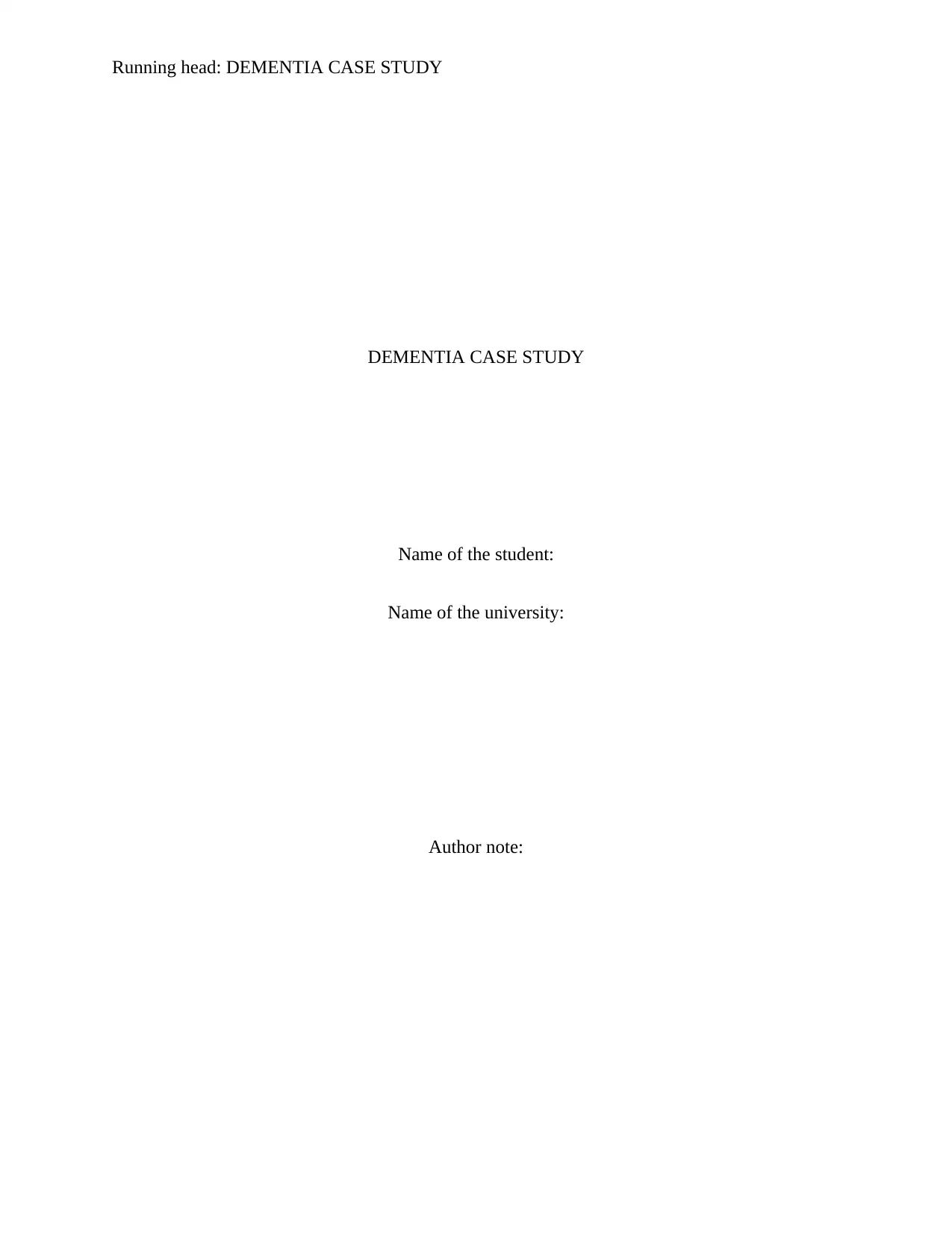
Running head: DEMENTIA CASE STUDY
DEMENTIA CASE STUDY
Name of the student:
Name of the university:
Author note:
DEMENTIA CASE STUDY
Name of the student:
Name of the university:
Author note:
Paraphrase This Document
Need a fresh take? Get an instant paraphrase of this document with our AI Paraphraser
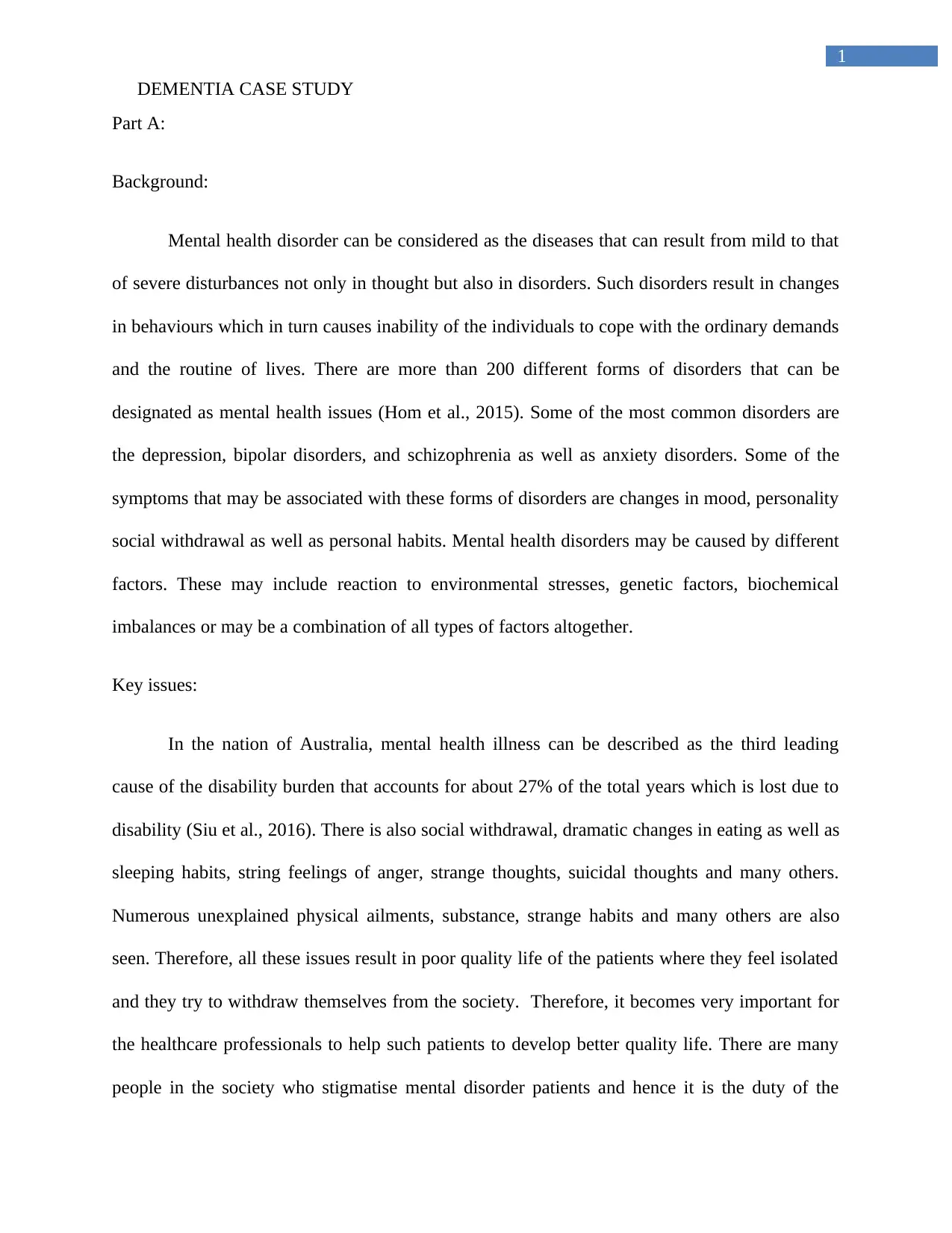
1
DEMENTIA CASE STUDY
Part A:
Background:
Mental health disorder can be considered as the diseases that can result from mild to that
of severe disturbances not only in thought but also in disorders. Such disorders result in changes
in behaviours which in turn causes inability of the individuals to cope with the ordinary demands
and the routine of lives. There are more than 200 different forms of disorders that can be
designated as mental health issues (Hom et al., 2015). Some of the most common disorders are
the depression, bipolar disorders, and schizophrenia as well as anxiety disorders. Some of the
symptoms that may be associated with these forms of disorders are changes in mood, personality
social withdrawal as well as personal habits. Mental health disorders may be caused by different
factors. These may include reaction to environmental stresses, genetic factors, biochemical
imbalances or may be a combination of all types of factors altogether.
Key issues:
In the nation of Australia, mental health illness can be described as the third leading
cause of the disability burden that accounts for about 27% of the total years which is lost due to
disability (Siu et al., 2016). There is also social withdrawal, dramatic changes in eating as well as
sleeping habits, string feelings of anger, strange thoughts, suicidal thoughts and many others.
Numerous unexplained physical ailments, substance, strange habits and many others are also
seen. Therefore, all these issues result in poor quality life of the patients where they feel isolated
and they try to withdraw themselves from the society. Therefore, it becomes very important for
the healthcare professionals to help such patients to develop better quality life. There are many
people in the society who stigmatise mental disorder patients and hence it is the duty of the
DEMENTIA CASE STUDY
Part A:
Background:
Mental health disorder can be considered as the diseases that can result from mild to that
of severe disturbances not only in thought but also in disorders. Such disorders result in changes
in behaviours which in turn causes inability of the individuals to cope with the ordinary demands
and the routine of lives. There are more than 200 different forms of disorders that can be
designated as mental health issues (Hom et al., 2015). Some of the most common disorders are
the depression, bipolar disorders, and schizophrenia as well as anxiety disorders. Some of the
symptoms that may be associated with these forms of disorders are changes in mood, personality
social withdrawal as well as personal habits. Mental health disorders may be caused by different
factors. These may include reaction to environmental stresses, genetic factors, biochemical
imbalances or may be a combination of all types of factors altogether.
Key issues:
In the nation of Australia, mental health illness can be described as the third leading
cause of the disability burden that accounts for about 27% of the total years which is lost due to
disability (Siu et al., 2016). There is also social withdrawal, dramatic changes in eating as well as
sleeping habits, string feelings of anger, strange thoughts, suicidal thoughts and many others.
Numerous unexplained physical ailments, substance, strange habits and many others are also
seen. Therefore, all these issues result in poor quality life of the patients where they feel isolated
and they try to withdraw themselves from the society. Therefore, it becomes very important for
the healthcare professionals to help such patients to develop better quality life. There are many
people in the society who stigmatise mental disorder patients and hence it is the duty of the
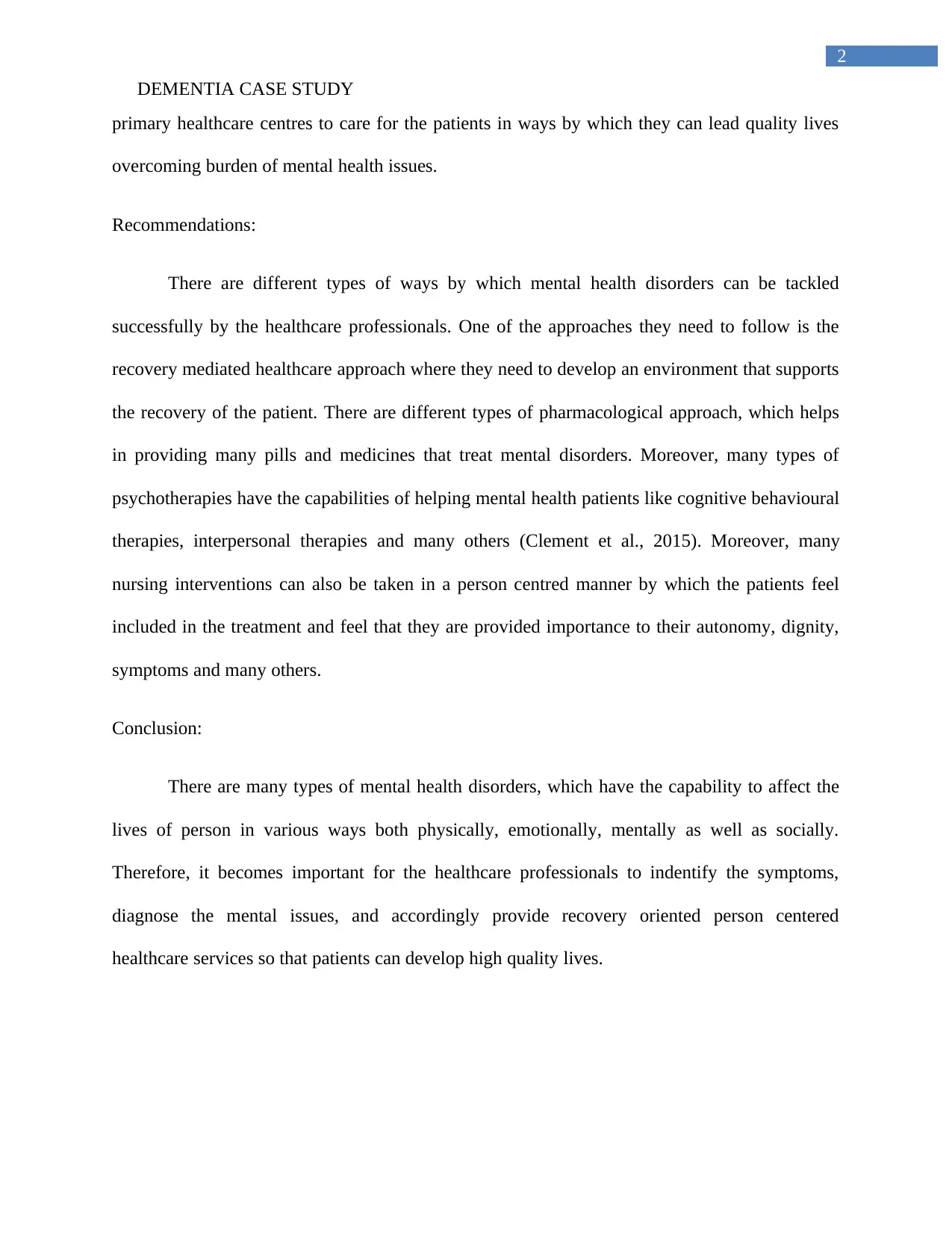
2
DEMENTIA CASE STUDY
primary healthcare centres to care for the patients in ways by which they can lead quality lives
overcoming burden of mental health issues.
Recommendations:
There are different types of ways by which mental health disorders can be tackled
successfully by the healthcare professionals. One of the approaches they need to follow is the
recovery mediated healthcare approach where they need to develop an environment that supports
the recovery of the patient. There are different types of pharmacological approach, which helps
in providing many pills and medicines that treat mental disorders. Moreover, many types of
psychotherapies have the capabilities of helping mental health patients like cognitive behavioural
therapies, interpersonal therapies and many others (Clement et al., 2015). Moreover, many
nursing interventions can also be taken in a person centred manner by which the patients feel
included in the treatment and feel that they are provided importance to their autonomy, dignity,
symptoms and many others.
Conclusion:
There are many types of mental health disorders, which have the capability to affect the
lives of person in various ways both physically, emotionally, mentally as well as socially.
Therefore, it becomes important for the healthcare professionals to indentify the symptoms,
diagnose the mental issues, and accordingly provide recovery oriented person centered
healthcare services so that patients can develop high quality lives.
DEMENTIA CASE STUDY
primary healthcare centres to care for the patients in ways by which they can lead quality lives
overcoming burden of mental health issues.
Recommendations:
There are different types of ways by which mental health disorders can be tackled
successfully by the healthcare professionals. One of the approaches they need to follow is the
recovery mediated healthcare approach where they need to develop an environment that supports
the recovery of the patient. There are different types of pharmacological approach, which helps
in providing many pills and medicines that treat mental disorders. Moreover, many types of
psychotherapies have the capabilities of helping mental health patients like cognitive behavioural
therapies, interpersonal therapies and many others (Clement et al., 2015). Moreover, many
nursing interventions can also be taken in a person centred manner by which the patients feel
included in the treatment and feel that they are provided importance to their autonomy, dignity,
symptoms and many others.
Conclusion:
There are many types of mental health disorders, which have the capability to affect the
lives of person in various ways both physically, emotionally, mentally as well as socially.
Therefore, it becomes important for the healthcare professionals to indentify the symptoms,
diagnose the mental issues, and accordingly provide recovery oriented person centered
healthcare services so that patients can develop high quality lives.
⊘ This is a preview!⊘
Do you want full access?
Subscribe today to unlock all pages.

Trusted by 1+ million students worldwide
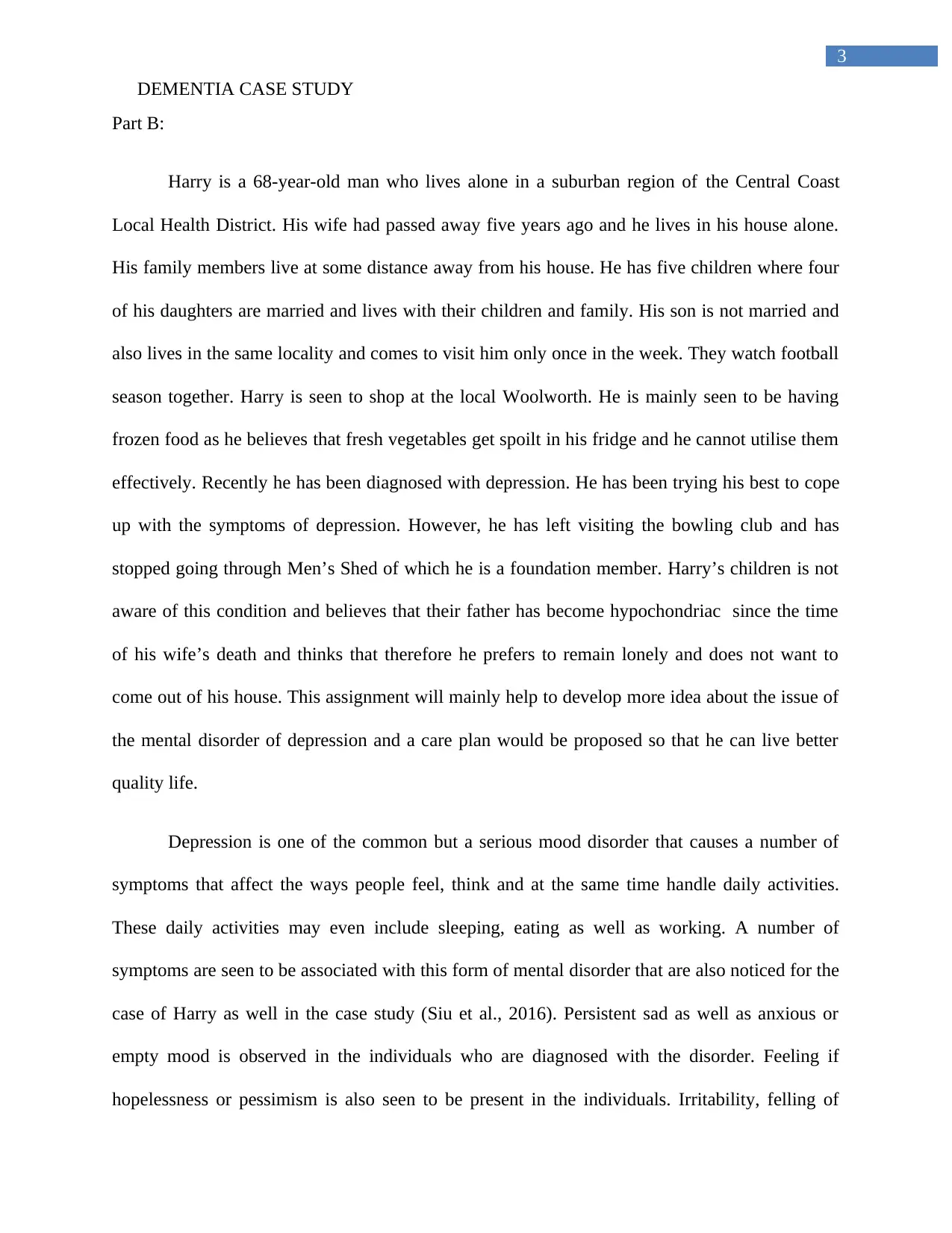
3
DEMENTIA CASE STUDY
Part B:
Harry is a 68-year-old man who lives alone in a suburban region of the Central Coast
Local Health District. His wife had passed away five years ago and he lives in his house alone.
His family members live at some distance away from his house. He has five children where four
of his daughters are married and lives with their children and family. His son is not married and
also lives in the same locality and comes to visit him only once in the week. They watch football
season together. Harry is seen to shop at the local Woolworth. He is mainly seen to be having
frozen food as he believes that fresh vegetables get spoilt in his fridge and he cannot utilise them
effectively. Recently he has been diagnosed with depression. He has been trying his best to cope
up with the symptoms of depression. However, he has left visiting the bowling club and has
stopped going through Men’s Shed of which he is a foundation member. Harry’s children is not
aware of this condition and believes that their father has become hypochondriac since the time
of his wife’s death and thinks that therefore he prefers to remain lonely and does not want to
come out of his house. This assignment will mainly help to develop more idea about the issue of
the mental disorder of depression and a care plan would be proposed so that he can live better
quality life.
Depression is one of the common but a serious mood disorder that causes a number of
symptoms that affect the ways people feel, think and at the same time handle daily activities.
These daily activities may even include sleeping, eating as well as working. A number of
symptoms are seen to be associated with this form of mental disorder that are also noticed for the
case of Harry as well in the case study (Siu et al., 2016). Persistent sad as well as anxious or
empty mood is observed in the individuals who are diagnosed with the disorder. Feeling if
hopelessness or pessimism is also seen to be present in the individuals. Irritability, felling of
DEMENTIA CASE STUDY
Part B:
Harry is a 68-year-old man who lives alone in a suburban region of the Central Coast
Local Health District. His wife had passed away five years ago and he lives in his house alone.
His family members live at some distance away from his house. He has five children where four
of his daughters are married and lives with their children and family. His son is not married and
also lives in the same locality and comes to visit him only once in the week. They watch football
season together. Harry is seen to shop at the local Woolworth. He is mainly seen to be having
frozen food as he believes that fresh vegetables get spoilt in his fridge and he cannot utilise them
effectively. Recently he has been diagnosed with depression. He has been trying his best to cope
up with the symptoms of depression. However, he has left visiting the bowling club and has
stopped going through Men’s Shed of which he is a foundation member. Harry’s children is not
aware of this condition and believes that their father has become hypochondriac since the time
of his wife’s death and thinks that therefore he prefers to remain lonely and does not want to
come out of his house. This assignment will mainly help to develop more idea about the issue of
the mental disorder of depression and a care plan would be proposed so that he can live better
quality life.
Depression is one of the common but a serious mood disorder that causes a number of
symptoms that affect the ways people feel, think and at the same time handle daily activities.
These daily activities may even include sleeping, eating as well as working. A number of
symptoms are seen to be associated with this form of mental disorder that are also noticed for the
case of Harry as well in the case study (Siu et al., 2016). Persistent sad as well as anxious or
empty mood is observed in the individuals who are diagnosed with the disorder. Feeling if
hopelessness or pessimism is also seen to be present in the individuals. Irritability, felling of
Paraphrase This Document
Need a fresh take? Get an instant paraphrase of this document with our AI Paraphraser
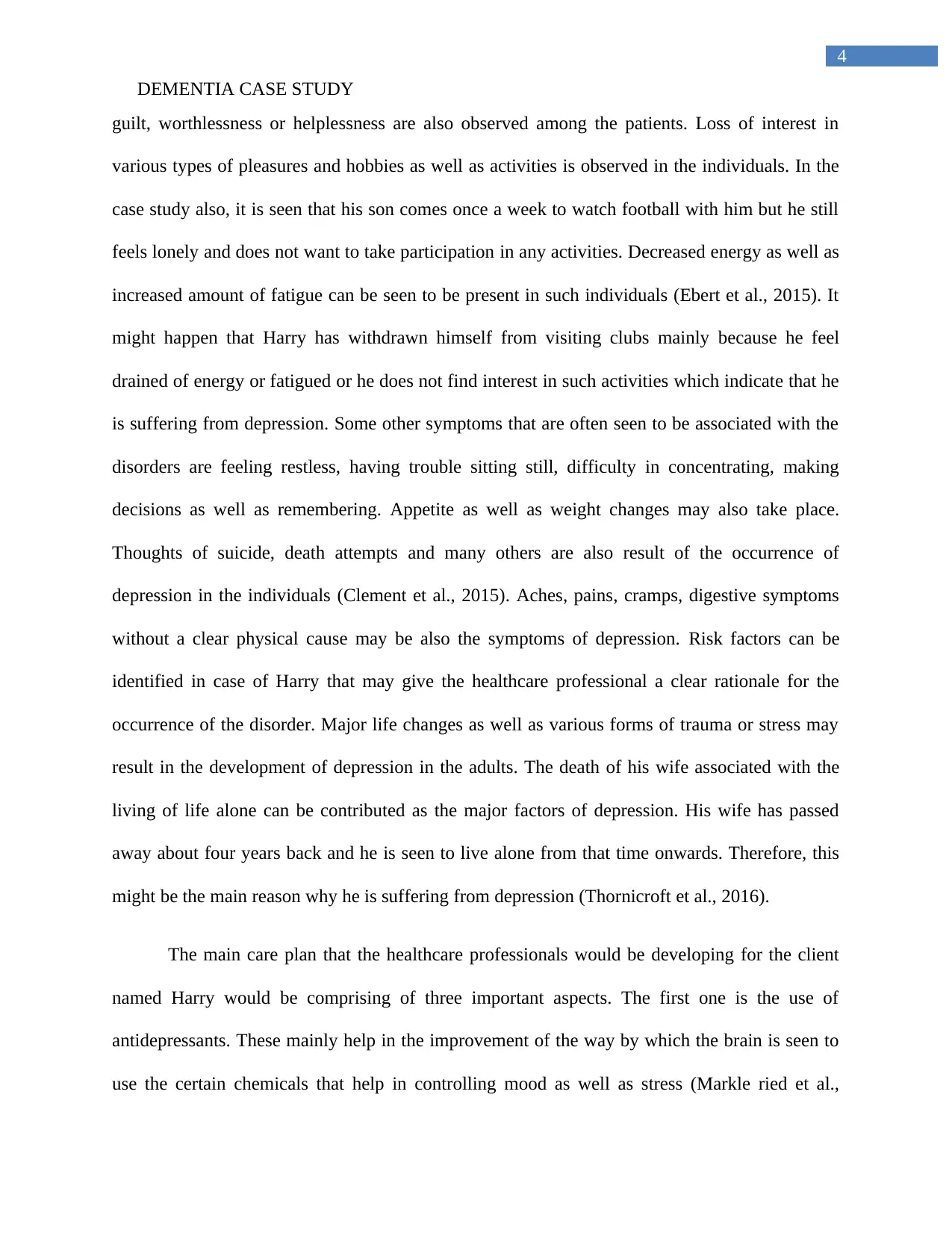
4
DEMENTIA CASE STUDY
guilt, worthlessness or helplessness are also observed among the patients. Loss of interest in
various types of pleasures and hobbies as well as activities is observed in the individuals. In the
case study also, it is seen that his son comes once a week to watch football with him but he still
feels lonely and does not want to take participation in any activities. Decreased energy as well as
increased amount of fatigue can be seen to be present in such individuals (Ebert et al., 2015). It
might happen that Harry has withdrawn himself from visiting clubs mainly because he feel
drained of energy or fatigued or he does not find interest in such activities which indicate that he
is suffering from depression. Some other symptoms that are often seen to be associated with the
disorders are feeling restless, having trouble sitting still, difficulty in concentrating, making
decisions as well as remembering. Appetite as well as weight changes may also take place.
Thoughts of suicide, death attempts and many others are also result of the occurrence of
depression in the individuals (Clement et al., 2015). Aches, pains, cramps, digestive symptoms
without a clear physical cause may be also the symptoms of depression. Risk factors can be
identified in case of Harry that may give the healthcare professional a clear rationale for the
occurrence of the disorder. Major life changes as well as various forms of trauma or stress may
result in the development of depression in the adults. The death of his wife associated with the
living of life alone can be contributed as the major factors of depression. His wife has passed
away about four years back and he is seen to live alone from that time onwards. Therefore, this
might be the main reason why he is suffering from depression (Thornicroft et al., 2016).
The main care plan that the healthcare professionals would be developing for the client
named Harry would be comprising of three important aspects. The first one is the use of
antidepressants. These mainly help in the improvement of the way by which the brain is seen to
use the certain chemicals that help in controlling mood as well as stress (Markle ried et al.,
DEMENTIA CASE STUDY
guilt, worthlessness or helplessness are also observed among the patients. Loss of interest in
various types of pleasures and hobbies as well as activities is observed in the individuals. In the
case study also, it is seen that his son comes once a week to watch football with him but he still
feels lonely and does not want to take participation in any activities. Decreased energy as well as
increased amount of fatigue can be seen to be present in such individuals (Ebert et al., 2015). It
might happen that Harry has withdrawn himself from visiting clubs mainly because he feel
drained of energy or fatigued or he does not find interest in such activities which indicate that he
is suffering from depression. Some other symptoms that are often seen to be associated with the
disorders are feeling restless, having trouble sitting still, difficulty in concentrating, making
decisions as well as remembering. Appetite as well as weight changes may also take place.
Thoughts of suicide, death attempts and many others are also result of the occurrence of
depression in the individuals (Clement et al., 2015). Aches, pains, cramps, digestive symptoms
without a clear physical cause may be also the symptoms of depression. Risk factors can be
identified in case of Harry that may give the healthcare professional a clear rationale for the
occurrence of the disorder. Major life changes as well as various forms of trauma or stress may
result in the development of depression in the adults. The death of his wife associated with the
living of life alone can be contributed as the major factors of depression. His wife has passed
away about four years back and he is seen to live alone from that time onwards. Therefore, this
might be the main reason why he is suffering from depression (Thornicroft et al., 2016).
The main care plan that the healthcare professionals would be developing for the client
named Harry would be comprising of three important aspects. The first one is the use of
antidepressants. These mainly help in the improvement of the way by which the brain is seen to
use the certain chemicals that help in controlling mood as well as stress (Markle ried et al.,
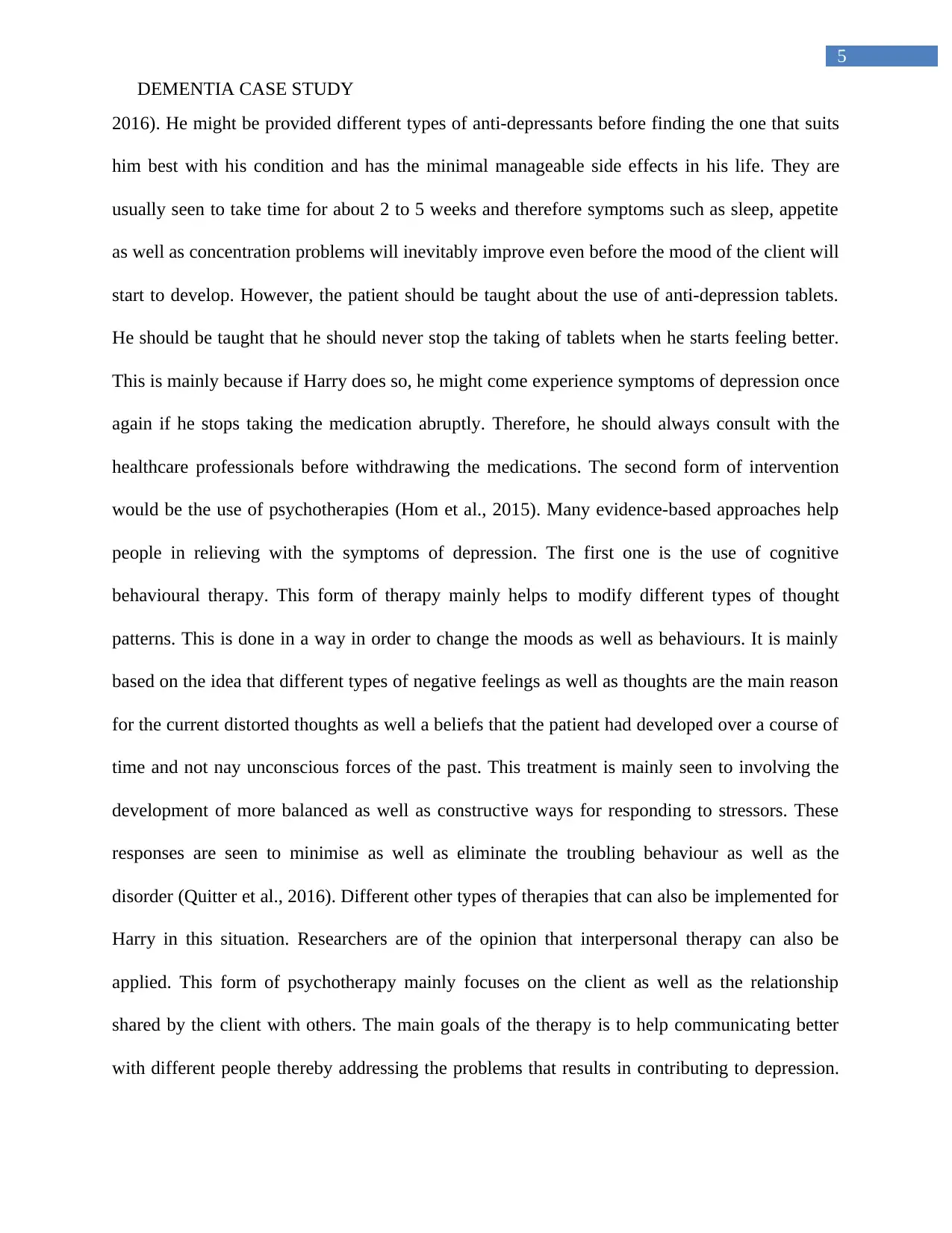
5
DEMENTIA CASE STUDY
2016). He might be provided different types of anti-depressants before finding the one that suits
him best with his condition and has the minimal manageable side effects in his life. They are
usually seen to take time for about 2 to 5 weeks and therefore symptoms such as sleep, appetite
as well as concentration problems will inevitably improve even before the mood of the client will
start to develop. However, the patient should be taught about the use of anti-depression tablets.
He should be taught that he should never stop the taking of tablets when he starts feeling better.
This is mainly because if Harry does so, he might come experience symptoms of depression once
again if he stops taking the medication abruptly. Therefore, he should always consult with the
healthcare professionals before withdrawing the medications. The second form of intervention
would be the use of psychotherapies (Hom et al., 2015). Many evidence-based approaches help
people in relieving with the symptoms of depression. The first one is the use of cognitive
behavioural therapy. This form of therapy mainly helps to modify different types of thought
patterns. This is done in a way in order to change the moods as well as behaviours. It is mainly
based on the idea that different types of negative feelings as well as thoughts are the main reason
for the current distorted thoughts as well a beliefs that the patient had developed over a course of
time and not nay unconscious forces of the past. This treatment is mainly seen to involving the
development of more balanced as well as constructive ways for responding to stressors. These
responses are seen to minimise as well as eliminate the troubling behaviour as well as the
disorder (Quitter et al., 2016). Different other types of therapies that can also be implemented for
Harry in this situation. Researchers are of the opinion that interpersonal therapy can also be
applied. This form of psychotherapy mainly focuses on the client as well as the relationship
shared by the client with others. The main goals of the therapy is to help communicating better
with different people thereby addressing the problems that results in contributing to depression.
DEMENTIA CASE STUDY
2016). He might be provided different types of anti-depressants before finding the one that suits
him best with his condition and has the minimal manageable side effects in his life. They are
usually seen to take time for about 2 to 5 weeks and therefore symptoms such as sleep, appetite
as well as concentration problems will inevitably improve even before the mood of the client will
start to develop. However, the patient should be taught about the use of anti-depression tablets.
He should be taught that he should never stop the taking of tablets when he starts feeling better.
This is mainly because if Harry does so, he might come experience symptoms of depression once
again if he stops taking the medication abruptly. Therefore, he should always consult with the
healthcare professionals before withdrawing the medications. The second form of intervention
would be the use of psychotherapies (Hom et al., 2015). Many evidence-based approaches help
people in relieving with the symptoms of depression. The first one is the use of cognitive
behavioural therapy. This form of therapy mainly helps to modify different types of thought
patterns. This is done in a way in order to change the moods as well as behaviours. It is mainly
based on the idea that different types of negative feelings as well as thoughts are the main reason
for the current distorted thoughts as well a beliefs that the patient had developed over a course of
time and not nay unconscious forces of the past. This treatment is mainly seen to involving the
development of more balanced as well as constructive ways for responding to stressors. These
responses are seen to minimise as well as eliminate the troubling behaviour as well as the
disorder (Quitter et al., 2016). Different other types of therapies that can also be implemented for
Harry in this situation. Researchers are of the opinion that interpersonal therapy can also be
applied. This form of psychotherapy mainly focuses on the client as well as the relationship
shared by the client with others. The main goals of the therapy is to help communicating better
with different people thereby addressing the problems that results in contributing to depression.
⊘ This is a preview!⊘
Do you want full access?
Subscribe today to unlock all pages.

Trusted by 1+ million students worldwide
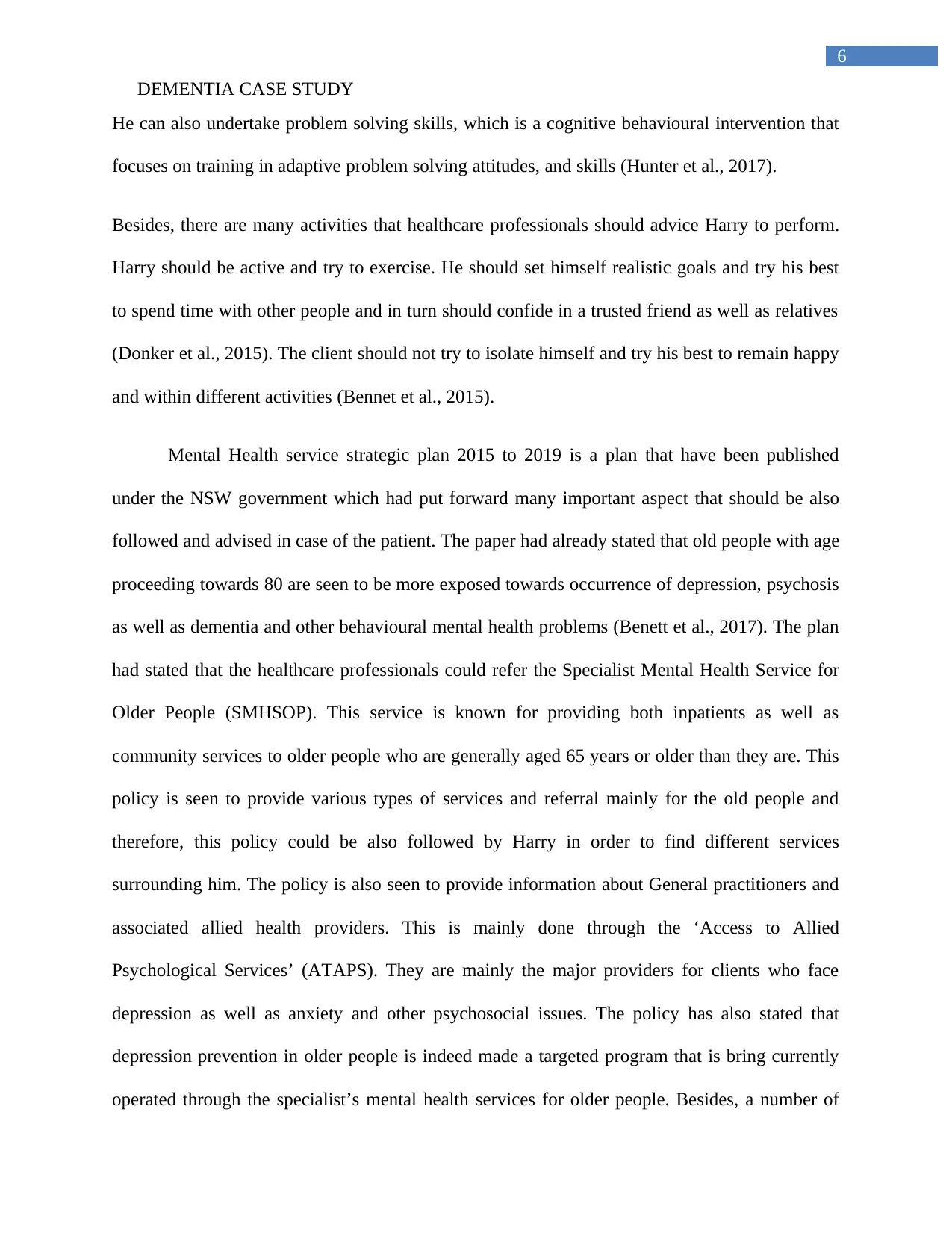
6
DEMENTIA CASE STUDY
He can also undertake problem solving skills, which is a cognitive behavioural intervention that
focuses on training in adaptive problem solving attitudes, and skills (Hunter et al., 2017).
Besides, there are many activities that healthcare professionals should advice Harry to perform.
Harry should be active and try to exercise. He should set himself realistic goals and try his best
to spend time with other people and in turn should confide in a trusted friend as well as relatives
(Donker et al., 2015). The client should not try to isolate himself and try his best to remain happy
and within different activities (Bennet et al., 2015).
Mental Health service strategic plan 2015 to 2019 is a plan that have been published
under the NSW government which had put forward many important aspect that should be also
followed and advised in case of the patient. The paper had already stated that old people with age
proceeding towards 80 are seen to be more exposed towards occurrence of depression, psychosis
as well as dementia and other behavioural mental health problems (Benett et al., 2017). The plan
had stated that the healthcare professionals could refer the Specialist Mental Health Service for
Older People (SMHSOP). This service is known for providing both inpatients as well as
community services to older people who are generally aged 65 years or older than they are. This
policy is seen to provide various types of services and referral mainly for the old people and
therefore, this policy could be also followed by Harry in order to find different services
surrounding him. The policy is also seen to provide information about General practitioners and
associated allied health providers. This is mainly done through the ‘Access to Allied
Psychological Services’ (ATAPS). They are mainly the major providers for clients who face
depression as well as anxiety and other psychosocial issues. The policy has also stated that
depression prevention in older people is indeed made a targeted program that is bring currently
operated through the specialist’s mental health services for older people. Besides, a number of
DEMENTIA CASE STUDY
He can also undertake problem solving skills, which is a cognitive behavioural intervention that
focuses on training in adaptive problem solving attitudes, and skills (Hunter et al., 2017).
Besides, there are many activities that healthcare professionals should advice Harry to perform.
Harry should be active and try to exercise. He should set himself realistic goals and try his best
to spend time with other people and in turn should confide in a trusted friend as well as relatives
(Donker et al., 2015). The client should not try to isolate himself and try his best to remain happy
and within different activities (Bennet et al., 2015).
Mental Health service strategic plan 2015 to 2019 is a plan that have been published
under the NSW government which had put forward many important aspect that should be also
followed and advised in case of the patient. The paper had already stated that old people with age
proceeding towards 80 are seen to be more exposed towards occurrence of depression, psychosis
as well as dementia and other behavioural mental health problems (Benett et al., 2017). The plan
had stated that the healthcare professionals could refer the Specialist Mental Health Service for
Older People (SMHSOP). This service is known for providing both inpatients as well as
community services to older people who are generally aged 65 years or older than they are. This
policy is seen to provide various types of services and referral mainly for the old people and
therefore, this policy could be also followed by Harry in order to find different services
surrounding him. The policy is also seen to provide information about General practitioners and
associated allied health providers. This is mainly done through the ‘Access to Allied
Psychological Services’ (ATAPS). They are mainly the major providers for clients who face
depression as well as anxiety and other psychosocial issues. The policy has also stated that
depression prevention in older people is indeed made a targeted program that is bring currently
operated through the specialist’s mental health services for older people. Besides, a number of
Paraphrase This Document
Need a fresh take? Get an instant paraphrase of this document with our AI Paraphraser
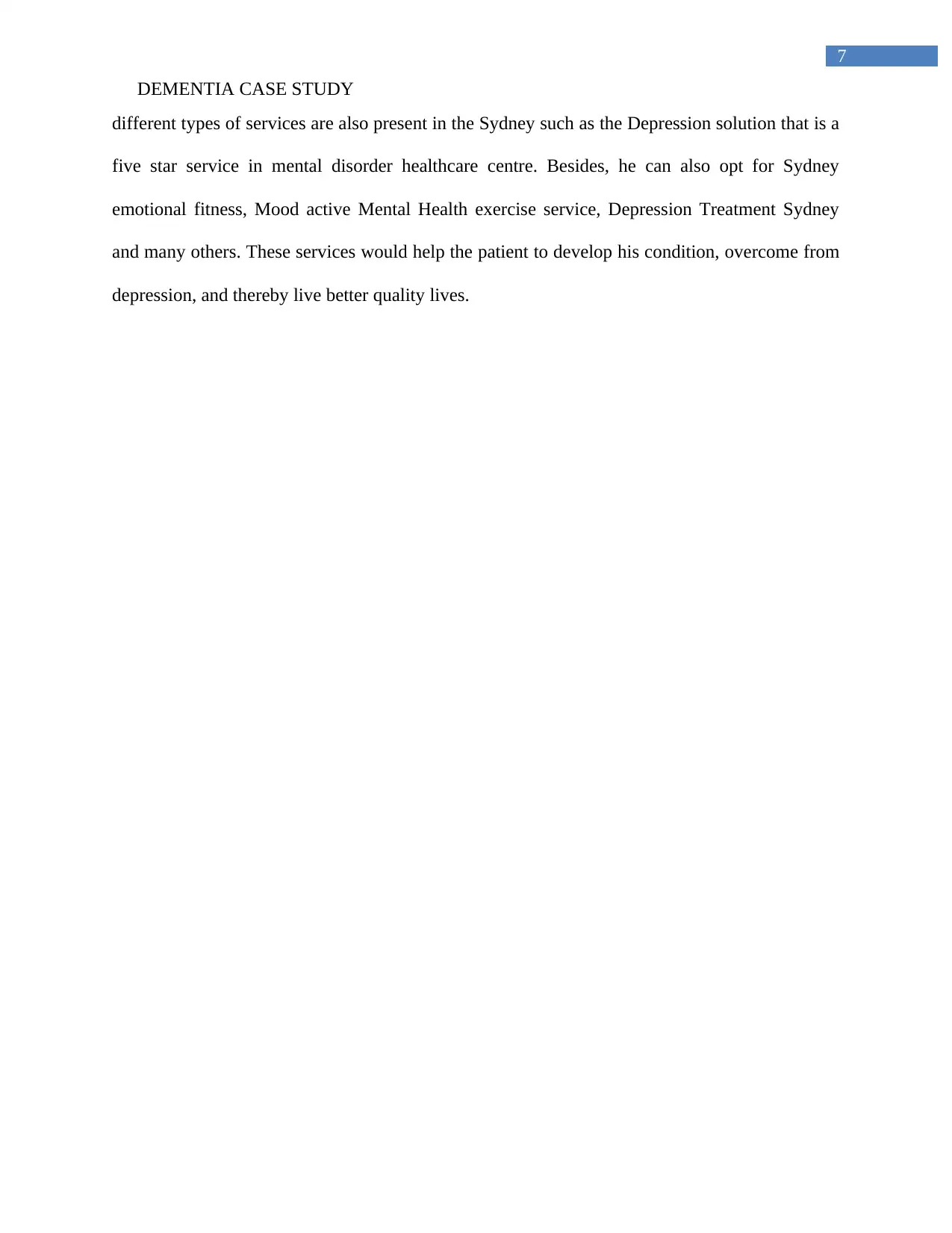
7
DEMENTIA CASE STUDY
different types of services are also present in the Sydney such as the Depression solution that is a
five star service in mental disorder healthcare centre. Besides, he can also opt for Sydney
emotional fitness, Mood active Mental Health exercise service, Depression Treatment Sydney
and many others. These services would help the patient to develop his condition, overcome from
depression, and thereby live better quality lives.
DEMENTIA CASE STUDY
different types of services are also present in the Sydney such as the Depression solution that is a
five star service in mental disorder healthcare centre. Besides, he can also opt for Sydney
emotional fitness, Mood active Mental Health exercise service, Depression Treatment Sydney
and many others. These services would help the patient to develop his condition, overcome from
depression, and thereby live better quality lives.
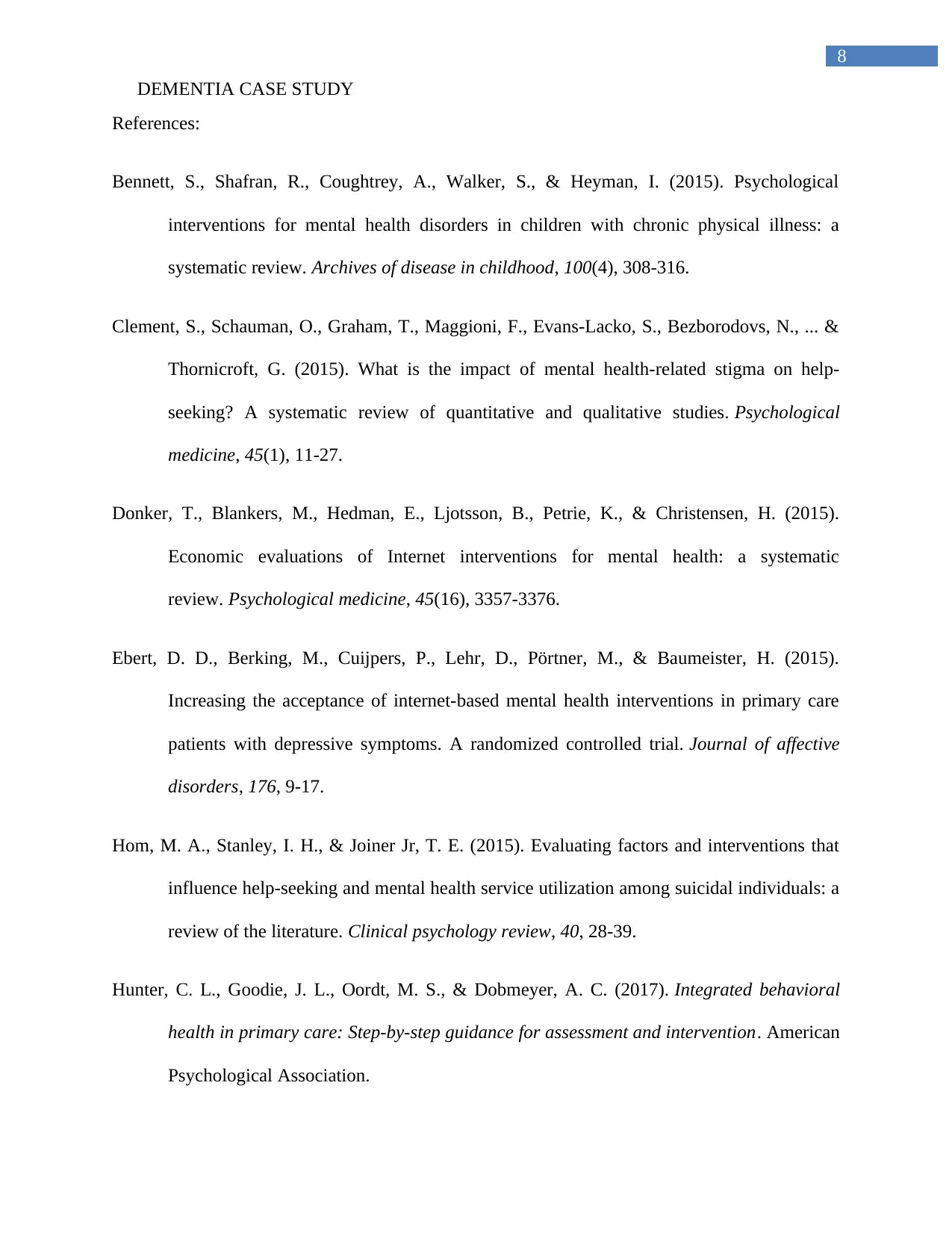
8
DEMENTIA CASE STUDY
References:
Bennett, S., Shafran, R., Coughtrey, A., Walker, S., & Heyman, I. (2015). Psychological
interventions for mental health disorders in children with chronic physical illness: a
systematic review. Archives of disease in childhood, 100(4), 308-316.
Clement, S., Schauman, O., Graham, T., Maggioni, F., Evans-Lacko, S., Bezborodovs, N., ... &
Thornicroft, G. (2015). What is the impact of mental health-related stigma on help-
seeking? A systematic review of quantitative and qualitative studies. Psychological
medicine, 45(1), 11-27.
Donker, T., Blankers, M., Hedman, E., Ljotsson, B., Petrie, K., & Christensen, H. (2015).
Economic evaluations of Internet interventions for mental health: a systematic
review. Psychological medicine, 45(16), 3357-3376.
Ebert, D. D., Berking, M., Cuijpers, P., Lehr, D., Pörtner, M., & Baumeister, H. (2015).
Increasing the acceptance of internet-based mental health interventions in primary care
patients with depressive symptoms. A randomized controlled trial. Journal of affective
disorders, 176, 9-17.
Hom, M. A., Stanley, I. H., & Joiner Jr, T. E. (2015). Evaluating factors and interventions that
influence help-seeking and mental health service utilization among suicidal individuals: a
review of the literature. Clinical psychology review, 40, 28-39.
Hunter, C. L., Goodie, J. L., Oordt, M. S., & Dobmeyer, A. C. (2017). Integrated behavioral
health in primary care: Step-by-step guidance for assessment and intervention. American
Psychological Association.
DEMENTIA CASE STUDY
References:
Bennett, S., Shafran, R., Coughtrey, A., Walker, S., & Heyman, I. (2015). Psychological
interventions for mental health disorders in children with chronic physical illness: a
systematic review. Archives of disease in childhood, 100(4), 308-316.
Clement, S., Schauman, O., Graham, T., Maggioni, F., Evans-Lacko, S., Bezborodovs, N., ... &
Thornicroft, G. (2015). What is the impact of mental health-related stigma on help-
seeking? A systematic review of quantitative and qualitative studies. Psychological
medicine, 45(1), 11-27.
Donker, T., Blankers, M., Hedman, E., Ljotsson, B., Petrie, K., & Christensen, H. (2015).
Economic evaluations of Internet interventions for mental health: a systematic
review. Psychological medicine, 45(16), 3357-3376.
Ebert, D. D., Berking, M., Cuijpers, P., Lehr, D., Pörtner, M., & Baumeister, H. (2015).
Increasing the acceptance of internet-based mental health interventions in primary care
patients with depressive symptoms. A randomized controlled trial. Journal of affective
disorders, 176, 9-17.
Hom, M. A., Stanley, I. H., & Joiner Jr, T. E. (2015). Evaluating factors and interventions that
influence help-seeking and mental health service utilization among suicidal individuals: a
review of the literature. Clinical psychology review, 40, 28-39.
Hunter, C. L., Goodie, J. L., Oordt, M. S., & Dobmeyer, A. C. (2017). Integrated behavioral
health in primary care: Step-by-step guidance for assessment and intervention. American
Psychological Association.
⊘ This is a preview!⊘
Do you want full access?
Subscribe today to unlock all pages.

Trusted by 1+ million students worldwide
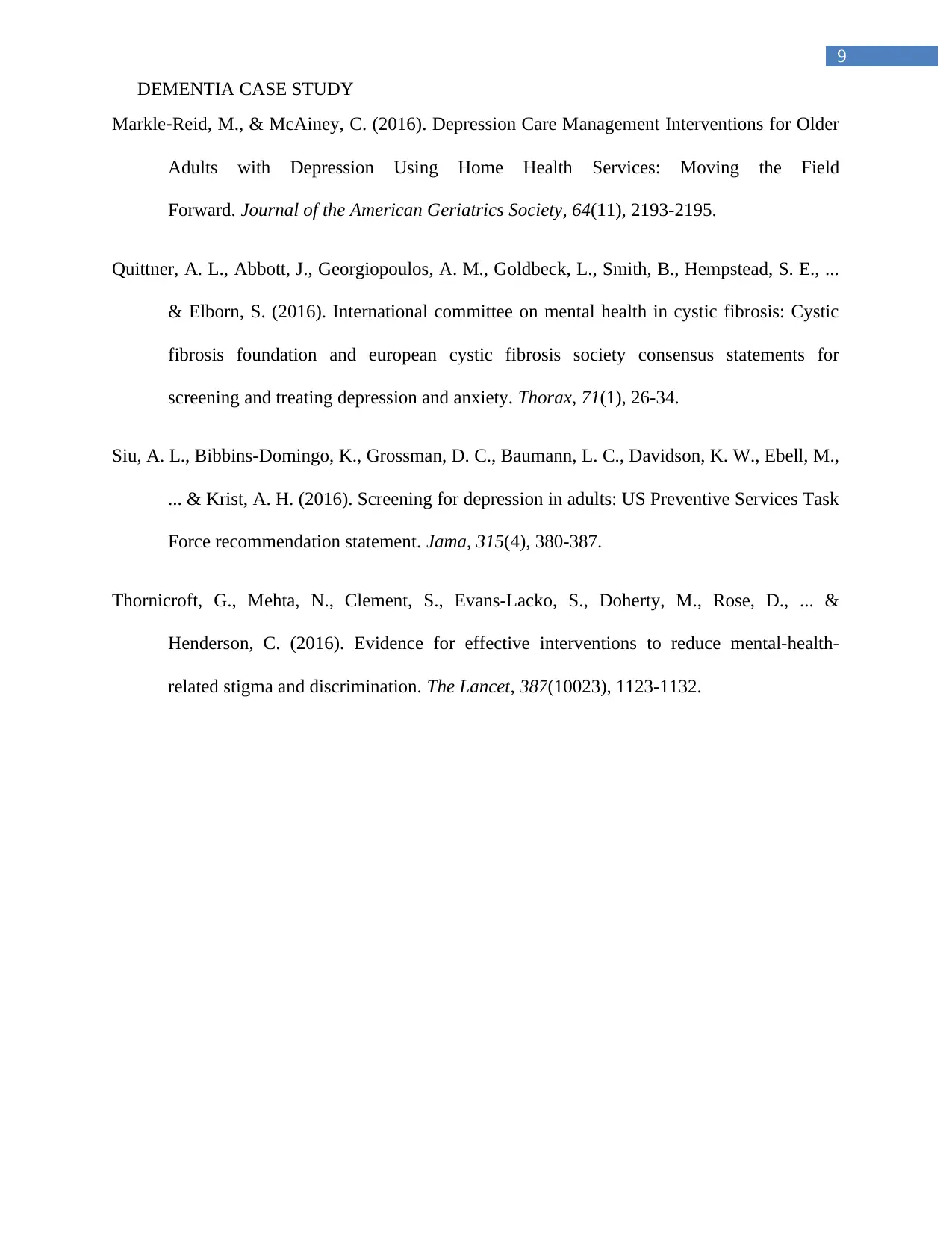
9
DEMENTIA CASE STUDY
Markle‐Reid, M., & McAiney, C. (2016). Depression Care Management Interventions for Older
Adults with Depression Using Home Health Services: Moving the Field
Forward. Journal of the American Geriatrics Society, 64(11), 2193-2195.
Quittner, A. L., Abbott, J., Georgiopoulos, A. M., Goldbeck, L., Smith, B., Hempstead, S. E., ...
& Elborn, S. (2016). International committee on mental health in cystic fibrosis: Cystic
fibrosis foundation and european cystic fibrosis society consensus statements for
screening and treating depression and anxiety. Thorax, 71(1), 26-34.
Siu, A. L., Bibbins-Domingo, K., Grossman, D. C., Baumann, L. C., Davidson, K. W., Ebell, M.,
... & Krist, A. H. (2016). Screening for depression in adults: US Preventive Services Task
Force recommendation statement. Jama, 315(4), 380-387.
Thornicroft, G., Mehta, N., Clement, S., Evans-Lacko, S., Doherty, M., Rose, D., ... &
Henderson, C. (2016). Evidence for effective interventions to reduce mental-health-
related stigma and discrimination. The Lancet, 387(10023), 1123-1132.
DEMENTIA CASE STUDY
Markle‐Reid, M., & McAiney, C. (2016). Depression Care Management Interventions for Older
Adults with Depression Using Home Health Services: Moving the Field
Forward. Journal of the American Geriatrics Society, 64(11), 2193-2195.
Quittner, A. L., Abbott, J., Georgiopoulos, A. M., Goldbeck, L., Smith, B., Hempstead, S. E., ...
& Elborn, S. (2016). International committee on mental health in cystic fibrosis: Cystic
fibrosis foundation and european cystic fibrosis society consensus statements for
screening and treating depression and anxiety. Thorax, 71(1), 26-34.
Siu, A. L., Bibbins-Domingo, K., Grossman, D. C., Baumann, L. C., Davidson, K. W., Ebell, M.,
... & Krist, A. H. (2016). Screening for depression in adults: US Preventive Services Task
Force recommendation statement. Jama, 315(4), 380-387.
Thornicroft, G., Mehta, N., Clement, S., Evans-Lacko, S., Doherty, M., Rose, D., ... &
Henderson, C. (2016). Evidence for effective interventions to reduce mental-health-
related stigma and discrimination. The Lancet, 387(10023), 1123-1132.
1 out of 10
Related Documents
Your All-in-One AI-Powered Toolkit for Academic Success.
+13062052269
info@desklib.com
Available 24*7 on WhatsApp / Email
![[object Object]](/_next/static/media/star-bottom.7253800d.svg)
Unlock your academic potential
Copyright © 2020–2026 A2Z Services. All Rights Reserved. Developed and managed by ZUCOL.





